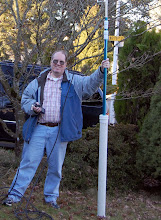Initially I thought we should have four class sessions, but several friends kept mentioning some things they thought everyone should hear. So, I changed my thinking with a general session (sometimes called a plenary session) at the beginning followed by three class periods of 50 minutes each. Since hams by nature are a rather gregarious group, the plan included 10 minutes between classes with a longer time between the second and third class session for a short break.
Then I started brainstorming to come up with at least a dozen class titles that sounded interesting. When I started showing the list around, I got more suggestions (very helpful) and some volunteers to teach one or more sessions. The classes tend to focus on areas that cause beginners to stumble. Hopefully the classes will trim the hurdle heights somewhat. The classes on the program so far include in no particular order:
- How to get the most from your handheld radio.
- Connectors and grounding.
- Simple VHF/UHF antennas.
- Simple HF antennas.
- Getting started with HF radio.
- Station types from handheld to HF.
- Operating mobile and portable.
- Operating in a contest.
- Care and feeding of batteries.
- Using your radio for public service.
- Digital communications.
- Communications during an emergency.
To date I have instructors for all but three classes. I hope to hear a positive answer from a potential instructor on one of those classes soon, so I have two more instructors to find.
A session like this would not be possible without a decent-sized venue. I gained permission to use a large church meetinghouse with rooms that can accommodate the general session and the classes. I think we could have up to 75 or so in some classes, depending on how many folks are interested in the program. The facility allows us to charge nothing for the event. Frugal (and sometimes cheap) hams should like that cost!
I am grateful for ten instructors so far agreeing to present one or more classes to help hams learn more about the hobby. The event will occur next month, and I plan to write about the results. My goal is to provide learning opportunities for new and experienced hams so we get better together.
During the general session, I plan to cover general principles for good electronic communication. I also plan to show where hams fit in the Incident Command System (ICS), mention good repeater protocol, a reminder about only using frequencies authorized to each licensee, family emergency communications plans (you have one, right?), and some related topics.
Once the publicity goes out later this week to the all and sundry, we will see how many folks are interested. Publicity for events like this are crucial for success. Fortunately a friend from our radio club will handle that part, and she manages to reach many people. For an event last year, our antenna seminar publicity reached the deep south from way up here in the northwest.
May you always be prepared for the unexpected, and enjoy the journey.



